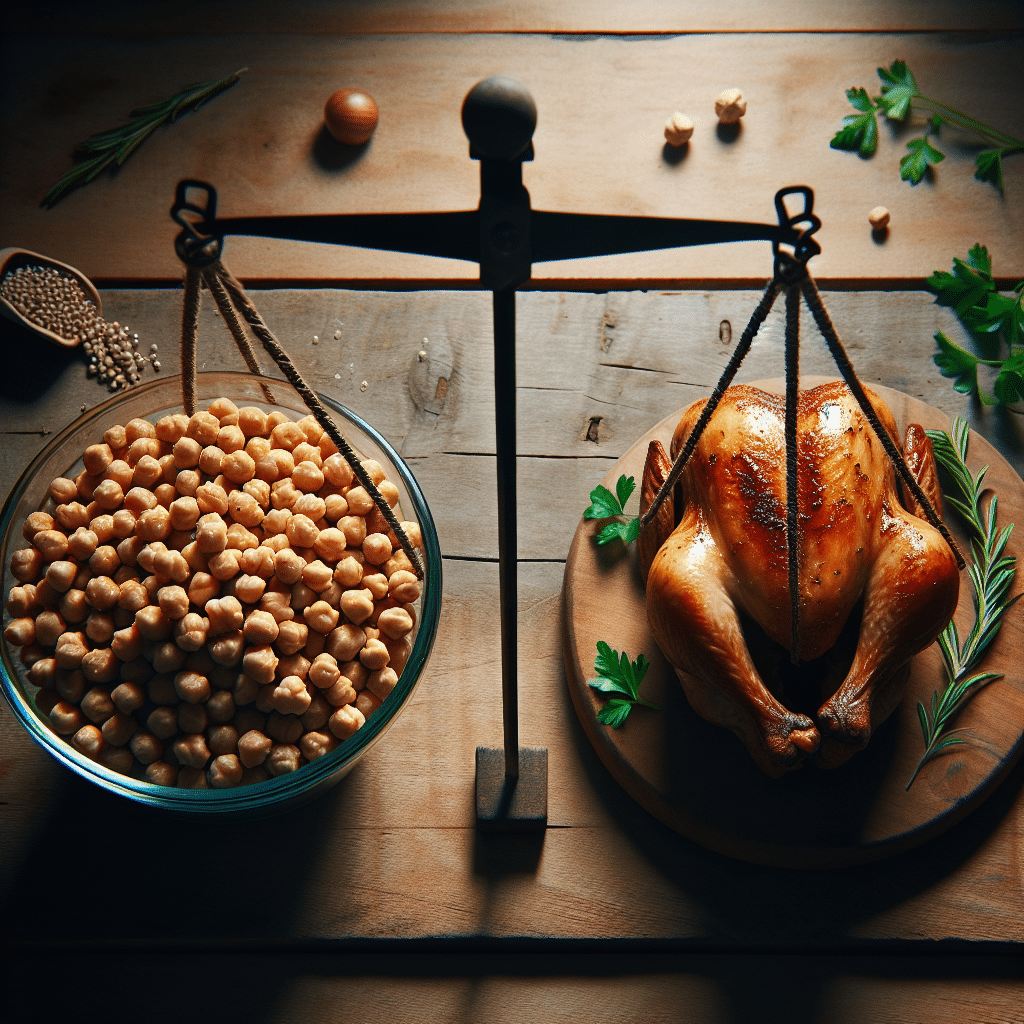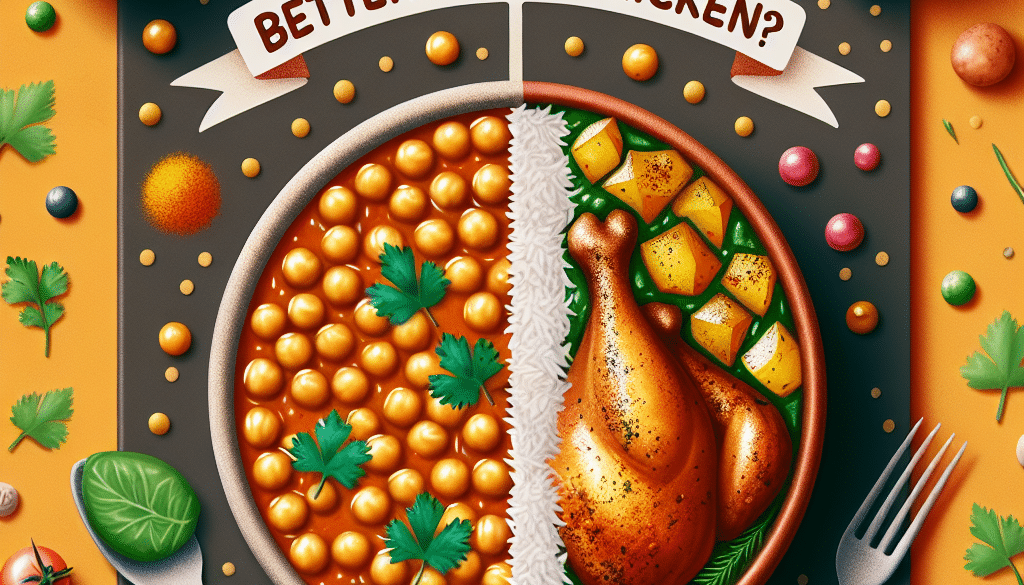Are Chickpeas Better Than Chicken?
-
Table of Contents
- Chickpeas vs. Chicken: A Nutritional Showdown
- Understanding the Nutritional Content
- Chickpeas: A Plant-Based Powerhouse
- Chicken: A Popular Protein Source
- Health Benefits and Risks
- Health Benefits of Chickpeas
- Health Benefits of Chicken
- Potential Risks
- Environmental Impact
- Chickpeas: A Sustainable Choice
- Chicken: A Moderate Environmental Footprint
- Cost and Accessibility
- Chickpeas: Economical and Widely Available
- Chicken: Varies by Cut and Quality
- Dietary Considerations
- Chickpeas: A Vegetarian and Vegan Staple
- Chicken: A Flexible Protein Source
- Conclusion: Balancing Nutrition, Environment, and Lifestyle
- Explore ETprotein’s Plant-Based Protein Products
Chickpeas vs. Chicken: A Nutritional Showdown

When it comes to choosing the best source of protein and nutrients for your diet, the debate between plant-based and animal-based foods is ongoing. Chickpeas and chicken are two popular options that often come up in discussions about healthy eating. But which one is better for you? In this article, we’ll delve into the nutritional profiles, health benefits, and environmental impacts of both chickpeas and chicken to help you make an informed decision.
Understanding the Nutritional Content
Before we can compare chickpeas and chicken, it’s important to understand what each offers in terms of nutritional value.
Chickpeas: A Plant-Based Powerhouse
- Rich in plant-based protein
- High in dietary fiber
- Contains essential vitamins and minerals like iron, folate, and magnesium
- Low in fat and free from cholesterol
Chicken: A Popular Protein Source
- Excellent source of lean protein
- Contains vitamins B6 and B12, important for energy and brain health
- Provides minerals such as zinc and selenium
- Low in saturated fat, especially when skinless
Health Benefits and Risks
Both chickpeas and chicken offer unique health benefits, but they also come with their own set of risks.
Health Benefits of Chickpeas
- May reduce the risk of chronic diseases due to high fiber content
- Supports weight management by promoting feelings of fullness
- Contributes to a healthy gut microbiome
- May help regulate blood sugar levels
Health Benefits of Chicken
- Supports muscle growth and repair with its high-quality protein
- May aid in weight loss due to its protein density and low calorie count
- Contributes to strong bones with its phosphorus content
- Supports immune function with zinc and selenium
Potential Risks
- Chickpeas: May cause bloating or gas in some individuals due to their high fiber content
- Chicken: Risk of bacterial contamination like salmonella if not properly cooked
- Chicken: May contain antibiotics or hormones depending on farming practices
Environmental Impact
The production of food not only affects our health but also the planet. Here’s how chickpeas and chicken stack up in terms of environmental sustainability.
Chickpeas: A Sustainable Choice
- Require less water and land to grow compared to animal protein sources
- Contribute to soil health by fixing nitrogen
- Lower greenhouse gas emissions than livestock farming
Chicken: A Moderate Environmental Footprint
- More sustainable than red meat but still requires significant resources for production
- Can lead to deforestation for feed production and grazing land
- Produces greenhouse gases, though less than beef or pork
Cost and Accessibility
When considering the cost and accessibility of chickpeas versus chicken, there are several factors to take into account.
Chickpeas: Economical and Widely Available
- Generally cheaper than chicken per serving
- Available in both dried and canned forms
- Long shelf life, reducing food waste
Chicken: Varies by Cut and Quality
- Cost can vary widely depending on the type of chicken and where it’s sourced
- Freshness is a factor, with a shorter shelf life than chickpeas
- Widely available but may be less accessible for those on a tight budget
Dietary Considerations
Personal dietary needs and preferences play a significant role in choosing between chickpeas and chicken.
Chickpeas: A Vegetarian and Vegan Staple
- Ideal for those following plant-based diets
- Can be used in a variety of dishes, from salads to stews
- Free from common allergens like dairy, nuts, and gluten
Chicken: A Flexible Protein Source
- Suitable for omnivorous diets and many dietary restrictions
- Can be cooked in numerous ways to suit different tastes
- May not be suitable for those with dietary restrictions like vegetarianism
Conclusion: Balancing Nutrition, Environment, and Lifestyle
In conclusion, both chickpeas and chicken have their own set of advantages and disadvantages. Chickpeas offer a sustainable, plant-based protein option with a host of health benefits, while chicken provides a high-quality animal protein that’s versatile and widely enjoyed. Your choice may depend on dietary preferences, environmental concerns, and nutritional needs.
Ultimately, a balanced diet that includes a variety of protein sources is often the best approach to ensure you’re getting all the nutrients your body needs. Whether you choose chickpeas, chicken, or a combination of both, being informed about your food choices can lead to a healthier lifestyle and a more sustainable world.
Explore ETprotein’s Plant-Based Protein Products
If you’re looking to incorporate more plant-based proteins into your diet, ETprotein offers a range of high-quality organic vegan protein products. Their selection includes organic rice protein, pea protein, and various seed proteins, all characterized by a neutral taste and non-GMO, allergen-free attributes. With L-(+)-Ergothioneine purity over 98%, ETprotein caters to diverse industries and dietary needs. To learn more about their offerings or to sample their products, contact ETprotein today.
About ETprotein:
ETprotein, a reputable protein and L-(+)-Ergothioneine (EGT) Chinese factory manufacturer and supplier, is renowned for producing, stocking, exporting, and delivering the highest quality organic bulk vegan proteins and L-(+)-Ergothioneine. They include Organic rice protein, clear rice protein, pea protein, clear pea protein, watermelon seed protein, pumpkin seed protein, sunflower seed protein, mung bean protein, peanut protein, and L-(+)-Ergothioneine EGT Pharmaceutical grade, L-(+)-Ergothioneine EGT food grade, L-(+)-Ergothioneine EGT cosmetic grade, L-(+)-Ergothioneine EGT reference grade and L-(+)-Ergothioneine EGT standard. Their offerings, characterized by a neutral taste, non-GMO, allergen-free attributes, with L-(+)-Ergothioneine purity over 98%, 99%, cater to a diverse range of industries. They serve nutraceutical, pharmaceutical, cosmeceutical, veterinary, as well as food and beverage finished product distributors, traders, and manufacturers across Europe, USA, Canada, Australia, Thailand, Japan, Korea, Brazil, and Chile, among others.
ETprotein specialization includes exporting and delivering tailor-made protein powder and finished nutritional supplements. Their extensive product range covers sectors like Food and Beverage, Sports Nutrition, Weight Management, Dietary Supplements, Health and Wellness Products, and Infant Formula, ensuring comprehensive solutions to meet all your protein needs.
As a trusted company by leading global food and beverage brands and Fortune 500 companies, ETprotein reinforces China’s reputation in the global arena. For more information or to sample their products, please contact them and email sales(at)ETprotein.com today.














